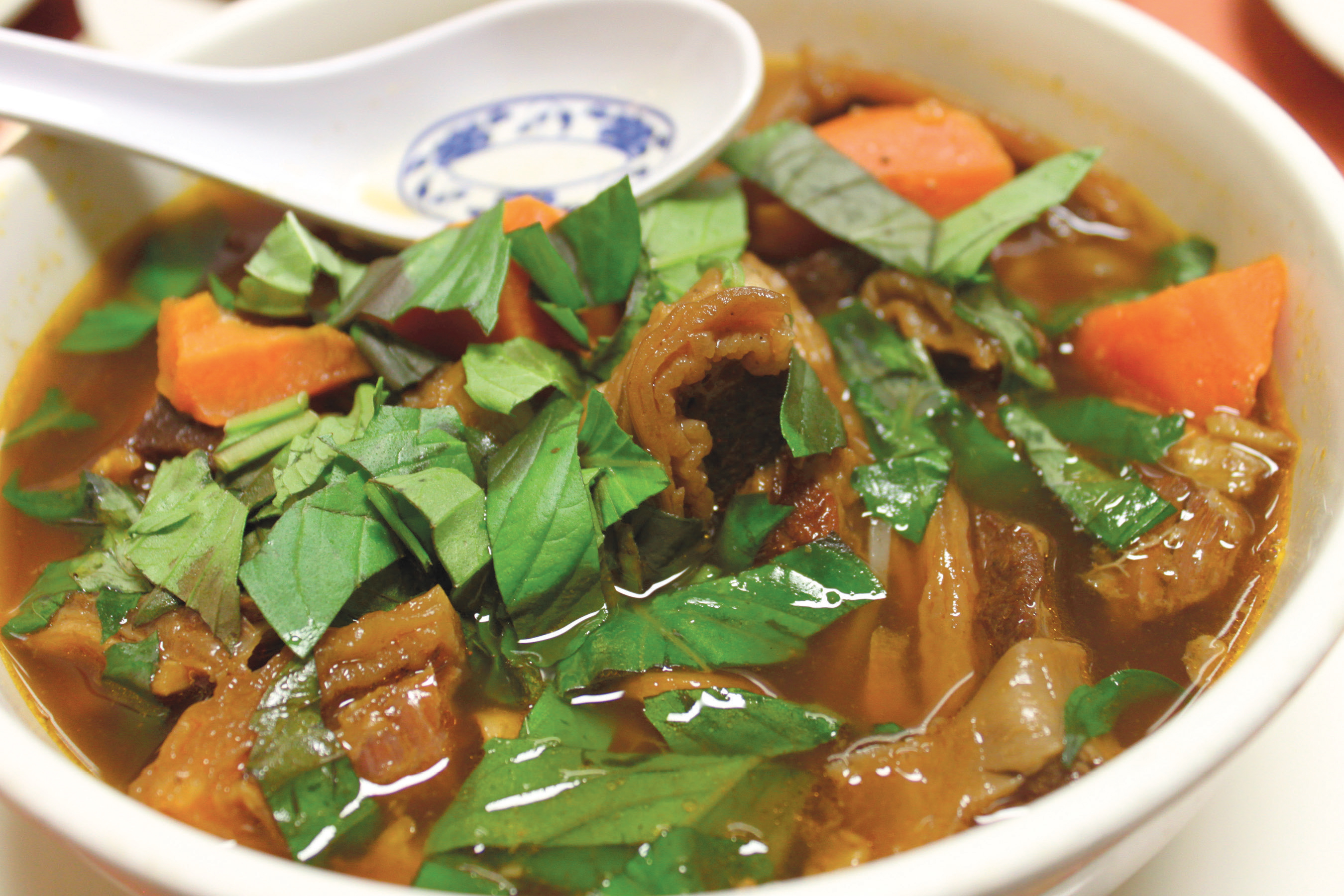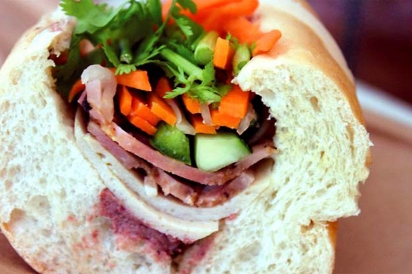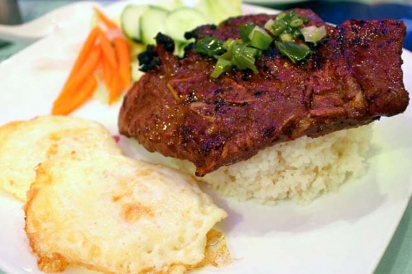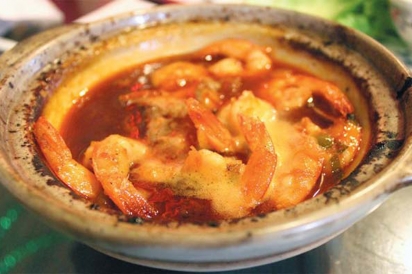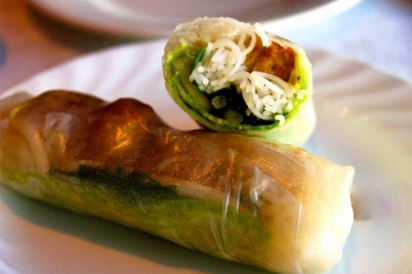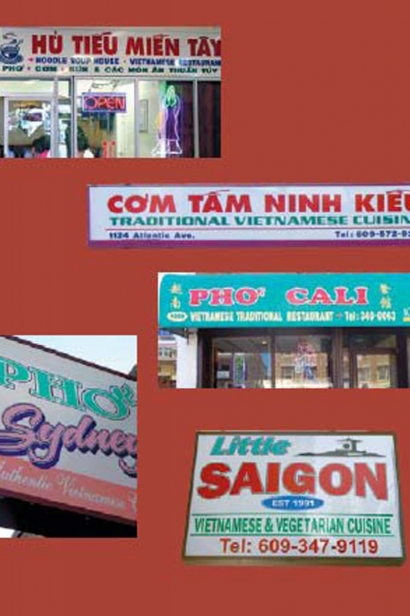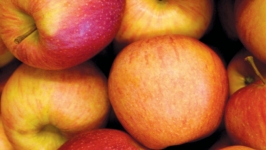Vietnamese Atlantic City Style
You might go for the boardwalk, casinos and nightlife, but do not leave Atlantic City without trying some of New Jersey's best Vietnamese food.
Why Atlantic City? Most of New Jersey's ethnic enclaves are in the northern half of the state, concentrated in the most densely populated cities. The Vietnamese are an exception. There are some 20,000 New Jerseyans of Vietnamese ancestry, and Camden and Atlantic counties have the highest populations. Look for clusters of Vietnamese restaurants and you will find them in Cherry Hill, outside Camden and in Atlantic City.
Kitty Nguyen, a friend and neighbor, is my expert guide on the intricacies of Vietnamese cuisine. After emigrating to the United States in 1975, Nguyen's family ran a well-respected French-Vietnamese restaurant in Virginia for more than two decades. "Cooking
Vietnamese food well is difficult because of the many nuances in a well-executed dish," says Nguyen. "Every Vietnamese dish and meal should balance multiple flavors – spicy, salty, sour, bitter and sweet; and textures – raw vegetables and charred meats, for example." Vietnamese cooking incorporates centuries of culinary influences from China (soy sauce, stir-frying, noodles), Mongolia (beef ) and Southeast Asia (curries and Indian spices). The French influence in Vietnamese cuisine is visible in the baguettes used for banh mi (sandwiches), the use of butter, and the preference for strongly brewed coffee. Vietnam's three regions each have distinctive dishes. Central Vietnam, especially the historic city of Hue, is known for elaborate meals. Northern Vietnamese cuisine, the food of Hanoi, features charcoal-grilled meats (bun cha), noodle dishes and beef pho (noodle soup) with flat rice noodles. Southern Vietnamese cuisine, served in Saigon (now Ho Chi Minh City), tends to be spicier and features the use of South Asian curries as well as more seafood.
My wife and I both enjoy Vietnamese food and, with Kitty's input, we made plans for a two-day summer getaway to Atlantic City to begin mapping the Vietnamese-food geography of Atlantic County.
Hu Tieu Mien Tay (700 Black Horse Pike, Pleasantville) was our first stop. Proprieter Thomas Vu had never planned to open a restaurant. He settled in Atlantic County in 1991, joining a brother who had emigrated from southern Vietnam a decade earlier. While working at an Atlantic City casino, Vu noticed an empty space in the back of a Pleasantville strip mall anchored by an Asian supermarket. He seized the opportunity and opened Hu Tieu Mien Tay. For nine years, Vu's "Noodle Soup House" has been serving some of the best traditional Vietnamese dishes in New Jersey.
To find the restaurant, hop off the parkway at Exit 37. Next to a Kmart, enter the Pleasantville Shopping Center under the "Asian Mall" sign. At the end of the hallway, past the Chinese supermarket, is the simple, cafeteria-style restaurant with about 70 seats.
We started with banh xeo, a shrimp and pork pancake appetizer. The huge, crispy omelet that arrived at our table was stuffed with bean sprouts, pork slices and cooked shrimp. You break off a piece, wrap it in a lettuce leaf, and dunk it in the small bowl of clear fish sauce (nuoc mam) placed on the table. Each delicious bite is simultaneously soft, crunchy, salty, sweet, warm and cool – those contrasting elements that distinguish Vietnamese cooking.
The menu translates hu tieu, which I ordered next, as "white noodle soup." The large bowl of sautéed beef–white noodle soup (hu tieu bo kho) has thin rice noodles (vermicelli), carrots, fresh cilantro and chunks of beef in a rich broth. The broth is exceedingly flavorful, no doubt because the beef is still attached to plenty of fat and cartilage. The meat is soft enough to pull right off with chopsticks if you are not into offal. My wife ordered one of her favorite Vietnamese dishes – fried spring rolls and barbecued pork atop a pile of vermicelli (bun cha gio thit nuong). The spring rolls here are excellent – paper- thin, crispy rice-paper wrappings filled with chopped pork and shrimp. We finished the meal with cups of strong, hot Vietnamese coffee, sweetened with condensed milk.
It's a good thing my wife and I arrived early for lunch, because by noon on this summer weekend day, every table was filled. Our bill totaled less than $35. I thought this was an excellent start as we pulled out of the parking lot for the short drive east toward Atlantic City, where money always disappears faster than you expect.
On our first morning in Atlantic City, we tried pho for breakfast at Com Tam Ninh Kieu, located two blocks west of the boardwalk (1124 Atlantic Ave.). "Oh, the broth is so clear" is the highest possible compliment from a Vietnamese grandmother evaluating a bowl of this popular breakfast dish, Kitty Nguyen tells me. Traditional pho simmers – never boils – for at least five hours, and is constantly strained and skimmed. The rich flavors emerge from the ingredients, with no shortcuts. Sweetness comes from the meat bones, never added sugar. There must be some fat, but not too much, floating on the surface. Serious pho fans consider broth clarity, flavor and ingredients. The broth is poured over fresh rice noodles with thin slices of raw beef. A plate of fresh herbs (cilantro and mint), raw bean sprouts, green chili peppers, and lemon or lime wedges comes with your bowl, so you can add flavors and textures to your liking.
The pho at Com Tam Ninh Kieu was the best bowl of soup we had during the trip – an extremely clear and flavorful broth with thin, tender beef slices still pink in the middle.
The restaurant's namesake, com tam, "broken rice," might be the perfect hangover food. Here, you can order the broken short-grain rice under various combinations of shredded pork, BBQ pork chop, steamed pork cake and fried eggs. The plate includes sweet pickled carrots and cucumbers, and homemade fish sauce for dipping (or just pour it over the rice pile as I did). The pork chop is thin and grilled in a sweet sauce that calls for picking it up to get every last bit of meat off the bone. Since it was breakfast, we ordered more Vietnamese coffee. A traditional Vietnamese coffee (ca phe den) is brewed in a single-serving, metal French-drip filter set over your cup at the table. For an intensely sweet treat, order your coffee with condensed milk (ca phe sua da). Our server reminded us to stir up the condensed milk from the bottom of the cup and gave us a thermos of hot water so we could dilute the coffee as we drank it.
Com Tam Ninh Kieu's owner, Michael Nguyen (no relation to Kitty), ran a restaurant of the same name in Saigon for 20 years before arriving in New Jersey in 1993. From all appearances, Com Tam Ninh Kieu is the Atlantic City spot preferred by Vietnamese customers. Like Hu Tieu Mien Tay in Pleasantville, this restaurant gets busy quickly, and large tables were filled with extended families.
Pho Sydney (2323 Atlantic Ave.) is the most spacious Vietnamese restaurant in Atlantic City, with diner-style booths and tables in a large dining room. Here at dinnertime, we got adventurous with our beverage choices. Many Vietnamese restaurants serve bubble tea, a Taiwanese import. Sinh to are the authentically Vietnamese fruit smoothies made with condensed milk, without the tapioca balls. We ordered two drinks we had seen on every menu – club soda with egg and condensed milk (ly soda sua hot ga) and green pennywort juice (ly rau ma). The former is essentially a Vietnamese egg cream, with a vanilla flavor. The latter tastes like sweet tea made from grass clippings – honestly, not as bad as it sounds. We did not sample the phohere, but enjoyed sautéed shrimp in a clay pot (tom ekho tau) with a sweet caramel-flavored sauce, over rice.
Banh mi, the popular Vietnamese French-baguette sandwiches, are perfect for a quick snack, or to take back to the room for late-night munchies. The freshness of the bread is key. It should be baked the same day, with a cracking, light crust. Balance, again, marks the dish. The traditional first layer is a pork paté, topped with pickled vegetables (daikon, carrots, cucumbers), sliced raw hot peppers (jalapeños), meat (ham, roast pork, or BBQ pork), cilantro stems, and a smear of butter on the top half of the baguette. Of the two we tried on our trip, Hu Tieu Mien Tay's in Pleasantville (purchased on the way back to the parkway) was the best.
During 48 hours in Atlantic City, we ate at five family-owned Vietnamese spots (see list below). We found very good examples of the balanced flavors and textures of Vietnamese cuisine. No bill totaled more than $35 before tip. In a town dedicated to taking money out of your pocket, not a bad strategy for eating well on the cheap.
ATLANTIC COUNTY’S VIETNAMESE RESTAURANTS
Com Tam Ninh Kieu – Atlantic City
1124 Atlantic Ave. 609.572.921
Hu Tieu Mien Tây – Pleasantville
700 Black Horse Pike 609.646.8977
Little Saigon – Atlantic City
2801 Arctic Ave. 609.347.9119
The oldest Vietnamese restaurant in Atlantic City, established in 1990. A tiny, cash-only spot that caters to non-Vietnamese diners (no chopsticks on the tables, no sliced jalapeños with your pho). Try the “country style” summer rolls (nem cuon) with chunky pork sausage.
Pho Cali – Atlantic City
3808 Ventnor Ave.
609.340.0063
Furthest away from the casinos, this restaurant is the most hole-in-the-wall Vietnamese spot in Atlantic City.
Pho Sydney – Atlantic City
2323 Atlantic Ave.
609.348.5946


